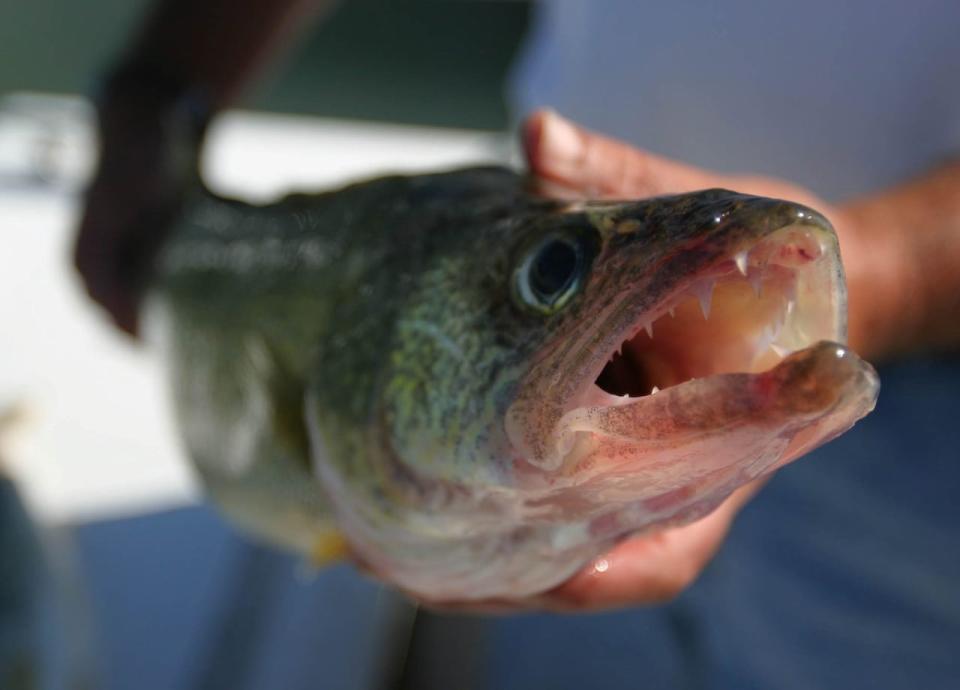Volunteers trying to restore fish stocks on what was once one of eastern Ontario’s “premier” walleye lakes say they’re being weighed down by bureaucratic demands that threaten to sink the entire project.
For decades, Golden Lake was considered one of the region’s top destinations to catch the popular game fish.
But numbers plunged in the 1980s and 1990s, and while walleye fishing was halted from 2002 until 2007 so the stocks could rebound, that never quite happened.
In recent years, a committee made up of residents, cottagers and fish experts has forged a plan to raise fingerlings — juvenile walleye just a few centimetres long — in protective nurseries until they’re large enough to survive predators like rainbow smelt.
The committee submitted the plan for the pilot project, which had support from the local MPP and the nearby Algonquins of Pikwakanagan First Nation, to the Ministry of Natural Resources (MNR).
They’d hoped to have fish in the water this summer. But now, they say they’re being stonewalled by the province’s bureaucracy.
“The ministry seems to have an attitude to put every roadblock up they can, hoping to burn you out so you’ll walk away and they don’t have to deal with you.” said Don Bishop, co-chair of the Golden Lake Property Owners Association’s fish committee and a longtime lake resident.
“It’s not just us. We’re being told that by other people.”

Walleye are a popular game fish that used to be prevalent on Golden Lake, located about 150 kilometres west of downtown Ottawa, until their numbers took a dive in the 1980s and 1990s. (Daniel Miller/Associated Press)
The group’s pilot project would involve raising juvenile walleye in specially designed floating fingerling nursery systems (FFNSs) on the lake for 107 days.
Over the past two years, committee members have met with numerous experts, from fish researchers and hatchery operators to members of various First Nations, and taken part in numerous meetings with MNR personnel.
But those meetings have gone nowhere, wrote now former co-chair Peter Heinermann in an Oct. 5 letter to the ministry.
After two years of impediments and stonewalling, I am done. – Peter Heinermann, fish committee’s former co-chair
“It has been very clear over the last two years that the ministry has been hiding behind every potential regulation to delay and/or derail the project, in the hopes that we will just go away,” wrote Heinermann, a retired staff member with the University of Ottawa’s biology department who holds a PhD in fish biology.
“After two years of impediments and stonewalling, I am done.”
One of those major impediments, the group says, is that the ministry has categorized their pilot project as a commercial aquaculture operation.
That means the volunteers, who have about $11,000 in their bank account from fundraisers like mug sales and fish fries, could have to spend somewhere from $50,000 to $90,000 to hire engineering firms and conduct environmental studies, said Bishop.
He said the MNR appears to be concerned over how much phosphorous and nitrogen the project might generate.
In abundance, phosphorous and nitrogen can lead to toxic algae blooms. But the FFNSs have retention devices that can remove fish feces and uneaten food daily, meaning the amount of nutrients that would end up in the lake is practically “undetectable,” Bishop said.
“That was the big issue for the ministry,” said Bishop. “[But] the rainbow smelt put more phosphorous and nitrogen in the water in one morning than we do in 107 days.”
Could be big economic benefits
If it’s established that the project could restore the walleye population, the Golden Lake area could eventually see tremendous economic benefit, said committee member Jay Foran.
“This was a premier lake. It drew fishermen from everywhere, and walleye was the target species,” said Foran, who also lives on the lake and whose extended family runs a cottage resort nearby.
“Up until the early 80s, my in-laws had 14 cabins. Every one of them was booked solid for the whole fishing season,” he said. “That’s all gone.”
The pilot project does appear to have support “in principle” of Minister of Natural Resources Graydon Smith, said John Yakabuski, the local PC MPP for Renfrew-Nipissing-Pembroke.
“All we want to see is a good return to a strong walleye fishery in Golden Lake,” said Yakabuski, who helped arrange a meeting between Smith and the volunteers in the summer.
“The minister obviously doesn’t have the ability to ignore regulations. But what we’re hoping — if it’s established as a pilot project — it can be given some exemptions to certain regulations so you can actually find out if it works or not.”


Jay Foran’s in-laws run a cottage resort up the road from Golden Lake. He says walleye fishing was a major economic driver for the region. (Trevor Pritchard/CBC)
MNR has ‘strict guidelines’
In a statement to CBC, the MNR said it has “strict guidelines for aquaculture proposals in public waters, applying to all cage aquaculture operations, whether commercial or not.”
Any activities approved by the ministry “must comply with federal and provincial laws and fisheries management policies,” a spokesperson said.
“The Golden Lake Property Owners Association needs to submit a complete application for cage aquaculture following these guidelines,” they wrote. “The ministry is working with the association to help them complete the application.”
Bishop said the committee wants the ministry to approve its first-year budget of about $45,000, and pledge to provide 5,000 fingerlings by mid-November or early December. That would give them enough time, he said, to get the FFNS units in the water in the spring of 2025.
Despite the delays, Bishop remains optimistic the province will come through.
“We’ve got the support of the minister’s office,” he said. “It’s just [that we need] to get the rank-and-file going.”

